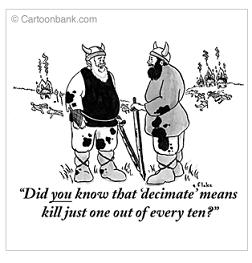Philosophical Speculations
Was Brontosaurus A Herbivore?
Delaying Gratification Is Easy If You Don't Try

Continue reading:
"Delaying Gratification Is Easy If You Don't Try" ››

 Score: 11 (13 votes cast)
Score: 11 (13 votes cast)
The Difference Between An Amateur, A Scientist, And A Genius
Around 1800, Herschel wanted to look at the Sun with his telescope, so to keep from going completely blind used different color filters to darken the image enough to be able to look at it.
What appeared remarkable was that when I used some of [the color filters], I felt a sensation of heat, though I had but little light; while others gave me much light, with scarce any sensation of heat.
Almost anyone could have made this observation. The point is what do you do next.
Continue reading:
"The Difference Between An Amateur, A Scientist, And A Genius" ››

 Score: 13 (15 votes cast)
Score: 13 (15 votes cast)
What Should Count As A Disease?
Continue reading:
"What Should Count As A Disease?" ››

 Score: 6 (6 votes cast)
Score: 6 (6 votes cast)
Biology Is Destiny
Question: does life begin at conception? Why, or why not?
Continue reading:
"Biology Is Destiny" ››

 Score: 3 (3 votes cast)
Score: 3 (3 votes cast)
The Special Circumstance Which Causes The Wisdom Of Crowds To Fail
Continue reading:
"The Special Circumstance Which Causes The Wisdom Of Crowds To Fail" ››

 Score: 5 (5 votes cast)
Score: 5 (5 votes cast)
The Boy Who Cried Wolf
Continue reading:
"The Boy Who Cried Wolf" ››

 Score: 94 (144 votes cast)
Score: 94 (144 votes cast)
Another Round Of The Ultimatum Game
Continue reading:
"Another Round Of The Ultimatum Game" ››

 Score: 2 (2 votes cast)
Score: 2 (2 votes cast)
The Ultimatum Game Is A Trap
Continue reading:
"The Ultimatum Game Is A Trap" ››

 Score: 2 (8 votes cast)
Score: 2 (8 votes cast)
Major Depression is Major Depression, Until Proven Otherwise
Continue reading:
"Major Depression is Major Depression, Until Proven Otherwise" ››

 Score: 2 (2 votes cast)
Score: 2 (2 votes cast)
Where Does A Tree Get Its Mass?
Continue reading:
"Where Does A Tree Get Its Mass?" ››

 Score: 48 (82 votes cast)
Score: 48 (82 votes cast)
The Dumbest Generation Is Only The Second Dumbest Generation
Continue reading:
"The Dumbest Generation Is Only The Second Dumbest Generation" ››

 Score: 56 (60 votes cast)
Score: 56 (60 votes cast)
Those Five Days Matter More Than Anything, Except The Other Days
You chose wrong.
Continue reading:
"Those Five Days Matter More Than Anything, Except The Other Days" ››

 Score: 17 (19 votes cast)
Score: 17 (19 votes cast)
Scientists Find Evidence For The Unconscious

Not exactly, but follow along with me.
Continue reading:
"Scientists Find Evidence For The Unconscious" ››

 Score: 2 (2 votes cast)
Score: 2 (2 votes cast)
Why Are Athletes Barely Better Than Their Competitors?
I'll admit I know nothing about sports, so I am asking for help on this one.
Continue reading:
"Why Are Athletes Barely Better Than Their Competitors?" ››

 Score: 2 (2 votes cast)
Score: 2 (2 votes cast)
Raising Wine Prices Makes Wine Taste Better
Continue reading:
"Raising Wine Prices Makes Wine Taste Better" ››

 Score: 2 (6 votes cast)
Score: 2 (6 votes cast)
The Extent Of Psychiatric Knowledge
|
If you got the right answer, you've wasted your life. If you got the answer wrong but then learned the correct answer, you are wasting other people's lives.
Continue reading:
"The Extent Of Psychiatric Knowledge" ››

 Score: 2 (4 votes cast)
Score: 2 (4 votes cast)
Desmond's Teleological Suspension of The Ethical-- Or My Novel?
A few weeks ago I had used a Lost storyline to explain my own view that we pick our own identities, rather than have them given to us through either genetics or the environment. I made Desmond the Abraham in Kierkegaard's Fear And Trembling.
The crux of the episode and the analogy is that Desmond thinks he can see the future, and see that Charlie will die. But Desmond then makes a vital moral step: he decides that it is also his responsibility to keep this character alive. (Quoting myself:)
The real question is why Desmond actually believes such a choice exists. How does he think he knows the future? Anyone else in his shoes would have come to a very different, more logical, conclusion: this is insane. What, he can predict the future? Worse: what, he's the only reason Charlie is alive? He's so-- necessary? Isn't that narcissism?
If Desmond knew he could predict the future-- if it was a fact that he could predict the future-- then saving Charlie would have little moral heroism. Any fool a step up from absolute evil would have tried to prevent a horrible outcome if he knew for certain what was going to happen.
What made Desmond worthy of admiration was, exactly, that he did not know for sure he could predict the future. He took it on faith that he could, and then proceeded to live his entire life based on this single, faith based, assumption.
That was Feb. 15. Strangely, I just saw last week's episode, in which Desmond turns out to have once been a a monk, and he has a discussion about Abraham and Isaac with another monk; the wine they make is named Moriah; and later Desmond explicitly references the test of faith-- straight out of Fear And Trembling.
I suppose this could be a coincidence.
Another possibility is the writers read and and love this blog and have gone and reshot future episodes based on my ideas. HA!
Another possibility is I write for Lost. HA HA!
But the final possibility is the most likely, and it has less to do with Lost and more to do with the direction of our fiction.
Pre 9-11, fiction, and especially sci-fi, had a distinctly post-modern flavor. The main character wasn't really a person, but reality-- that it was wrong, or hidden. This culminated in the Matrix. The important concept wasn't altering reality for some purpose; it was that reality itself was a fabrication, the Demiurge hiding real reality behind a fake one.
The story goes that Darren Aranofsky (director of Pi) and Jared Leto walked out of the Matrix and asked, "What kind of science fiction movie can people make now?" The point was that the postmodern slant, cyber-realities, etc, were done as well as they could be. So, too, CGI. From now on anything else would be coattail riding. (Think how Pulp Fiction degenerated into Go and 2 Days In The Valley.) The genre was finished.
So what's next? Well, for Aranofsky the answer was the mind (see The Fountain), but I'd suggest an even broader answer: ideas. The next genre of sci-fi, or fiction- has to be about the conflict of ideas, identities.
If I was going to write a novel-- and who says I'm not?-- I'd take advantage of our societal narcissism, our search for identity-- and, more importantly, for excuses why we have certain identities; our fear of death manifesting as age-postponement; and the decline of truly meaningful relationships to write a sci-fi novel about what really keeps us linked to each other.
The operative question would be: if you could be anyone, had unlimited power, what would be the ethical system you use to make choices? Who lives, who dies, who suffers, who doesn't? How do you decide?
The first element would be Faith. So, with a parting wave to postmodernism, the protagonist can see the future or alter reality, except that he's not sure he can do this. Worse, every time he alters reality by avoiding a future he has supposedly seen, he creates a new future he didn't predict-- but this is, of course, no different than normal life. In other words, by avoiding the future he predicted, he negates the proof that he saw the future. So he has to have Faith that he has this power, in the absence of any evidence. The protagonist of my book won't have any objective evidence that he is right or doing the right thing, he simply will have to believe, to decide, that he's right. It has to be identical to, say, psychosis.
In Lost, Desmond still has objective evidence that he predicted the future, even though it gets altered; he sees an arrow; they did talk about Superman; the parachutist looked the way he foresaw it. So this isn't exactly a leap of faith. Similarly, if Abraham really knows God exists, then sacrificing Isaac isn't wrong or even strange-- God wants, God gets.
Unlike Desmond, who has to decide only if he should save Charlie, my character would have to both decide he can see the future, and also that it is his responsibility to act on it. This brings us to:
The second element, Duty. In making these decisions and accepting these beliefs-- altering reality along the way-- he'll have to establish a hierarchy of good and bad. What is he supposed to do? Does he have any duty towards anything? For the plot, this will require some symbol, metaphor. A good one might be a piece of jewelry-- some object which changes depending on the chosen duty. It's a ring, it's a sword, it's a bandage, etc-- it's the same "object" that he carries, but it changes.
The third element is Rage. When you believe something that no one else believes-- especially if you believe you are somehow better, or even different, than others; and if others directly oppose you in this belief, the inevitable consequence is rage. How to depict this?
The fourth element is Love. The negating force for Rage. This character will need to identify what he loves, and how-- platonic, romantic, etc; a plot-trick might involve altering reality and therefore altering the character of his love (for example, a woman he loves may later become his sister, etc.)
To make the reader share the magnitude of the protagonist's Faith dilemma-- in order to ensure that the reader does not "suspend disbelief" and automatically buy into the protagonist's powers (the way we have with Desmond,) you'd have to write the book from the perspective of a second character, who describes the story of the protagonist. You should never actually get to interact directly with the protagonist, you should never actually hear him speak, only this second character. This way, you're never sure what to make of the protagonist or his adventures.
Preliminary thoughts, anyway. Looking forward to the next Lost and JJ Abrams stealing my ideas. ;-)

 Score: 2 (2 votes cast)
Score: 2 (2 votes cast)
The Trouble With Psychiatry-- "Not Even Wrong"
I recently read Martin Gardner's review in the New Criterion of Lee Smolin's The Trouble With Physics, and Peter Woit's Not Even Wrong: The Failure of String Theory.
I am almost finished Smolin's book, but I wanted to make a comment about Gardner's piece. Writing in the New Criterion, he should have appreciated a wider view of the books, that they speak to more than physics. They're just as much about psychiatry.
Continue reading:
"The Trouble With Psychiatry-- "Not Even Wrong"" ››

 Score: 2 (2 votes cast)
Score: 2 (2 votes cast)
Sleep Loss And Moral Judgment

There's an article making the rounds that I'd like to kill off right now, before it becomes a meme, or worse, another unsupported postulate common among psychiatrists.
The title of the Reuters news story about the article (in Sleep) is this: "Sleepless nights may hinder moral judgments." And has sentences like this: "[subjects] took a longer time to mull over the morally charged questions when they were sleep-deprived than when they were well rested. This was not the case with the more minor, non-moral scenarios."
And there's your self-serving, exculpatory imbecility of the day: a sleepless night or two turns us into lycanthropes, or at least hyenas. ("I was so tired I couldn't think straight.") Fortunately for the existentialists, the Reuters reporter didn't actually read the Sleep article, which doesn't actually say this.
The Army study subjected volunteers to 53 hours of sleep deprivation and presented them with a battery of moral dilemma type questions ("is it morally appropriate or inappropriate to do X if Y is at stake?")
In contrast to the obvious suggestions of the Reuter's title, the study found that it took sleep deprived subjects longer to identify something as morally appropriate, but had no effect on how long it took to label it inappropriate. In fact, relative to a non-moral issue, sleep deprived subjects were able to label something as morally inappropriate faster.
Quoting the authors:
When tested at rested baseline, participants showed no significant differences between response times for scenarios judged as “appropriate” versus those judged as “inappropriate” .... In contrast, when deprived of sleep for over 53 hours, these same participants showed significantly greater difficulty judging emotionally charged MP (personal moral) courses of action as “appropriate” relative to judging them as “inappropriate.”
In other words, sleep deprivation made it harder for them to say something was right, but not harder to say it was wrong. To use a metaphor, you "know" things are wrong; but you may have to judge if they are right.
The study also looked into whether people labeled something as morally appropriate more often if they were sleep deprived, i.e. were they more permissive. First, if the subject had high emotional intelligence, sleep loss had no effect. Secondly, having an "average" emotional intelligence lead to an increase in the number of scenarios labeled appropriate: 2/10 when rested vs. 4/10 when sleep deprived. In other words, people with high emotional intelligence have stable, "unwavering" moral judgments, even in the face of sleep loss. Or, put another way: if you're clear on what you believe, sleep deprivation isn't likely to confuse you.
This is important because the Reuter's title, and indeed the psychiatric utilization of this idea, puts the ability (or inability) to make moral judgments on external factors-- "he was sleep deprived, and that impacts your judgment." This is prima facie false; but anyway is not supported even by the very science they themselves use to back the claims.
We can set aside the debate on whether chemicals and psychosis can alter moral judgments; but I think it's fairly safe to say that if your moral judgments are affected by 53 hours of sleep deprivation, sleep isn't the problem.
-------
Note: the study also found that caffeine did not reverse the alterations in moral judgments due to sleep loss. I don't buy it; more later.

 Score: 1 (1 votes cast)
Score: 1 (1 votes cast)
For more articles check out the Archives Web page ››

